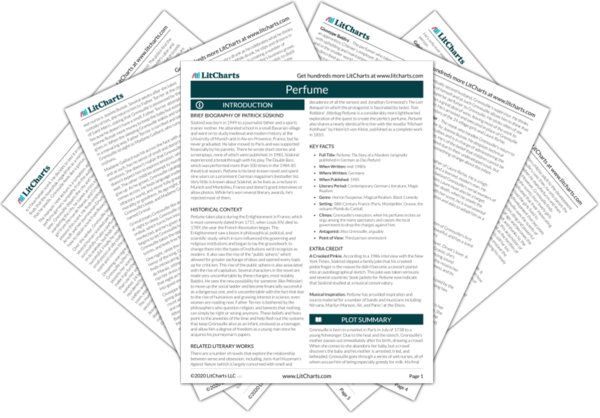Summary
Analysis
While Grenouille would've loved to leave for Grasse as soon as he recovered, as an apprentice he's still a nobody. Baldini explains that technically, Grenouille is less than a nobody, as a proper apprentice needs to be of legitimate birth, among other things. Baldini says that if he one day decides to help Grenouille obtain his journeyman's papers, it would be only based on Grenouille's talents and good behavior, and Baldini's own kindness.
Here, the acquisition of journeyman's papers is a marker of personhood, and by the logic of the novel, adulthood. Grenouille remains a “tick” and a nobody until he obtains these papers and makes the shift from valueless child to a fully human adult with agency and independence.
Themes
This would come to pass within three years. During that time, Baldini achieves his dreams of building the factory, receives a royal patent, and starts selling perfumes across Europe. By 1756, Baldini is Europe's greatest perfumer.
Baldini has achieved the fame he dreamed of, and sees that he has no more use for Grenouille (remember that Baldini has Grenouille's formulas recorded).
Themes
At this time, Baldini tells Grenouille he'll release him on three conditions. Grenouille must not produce any of the perfumes he'd made for Baldini; he must leave Paris and not return until after Baldini's death; and he must keep the first two conditions secret. Grenouille agrees without question, as he needs his journeyman's paper to travel and live inconspicuously, and feels no love for Paris. Grenouille, the narrator states, isn't out to make his fortune through perfume—he simply wants to create in the real world the perfumes that he holds in his mind.
Baldini's conditions here hinge on Baldini's incorrect assumption that Grenouille is a social climber in the same way that Baldini is, and that Grenouille desires money and fame. This assumption will be made by several individuals over the course of the novel, and serves to differentiate between Grenouille and the rest of humanity.
Themes
Grenouille sets out in May of 1756 with some food and money from Baldini. Baldini, a chronically kind person, requires nothing more than a small severance fee. He wishes Grenouille luck and watches him go. He doesn't shake Grenouille's hand, though, as he senses an infectious danger in Grenouille.
Upon Grenouille's departure, Baldini finally admits that there's something strange about Grenouille, as if seeing him as a person (rather than a money-making machine) for the first time.
Themes
Get the entire Perfume LitChart as a printable PDF.













